Introduction
Welcome to the annual report of the Sustainability, Energy & Environment (SEE) programme of the University of Twente. On this page, you will find an overview of the actions UT has taken in 2024 to become a sustainable organization, split up into various themes.
Do you have any questions after reading? Or do you have ideas on how to make our organization more sustainable? Then please contact us through sustainability@utwente.nl!
Highlights & links
Energy
Energy use at the UT went down across the board. The biggest reduction was achieved in natural gas usage, which went down with 26% compared to 2023 and 59% compared to 2019. This fits in UT’s long-term goal to phase out natural gas use on campus. The remaining natural gas is used primarily for air humidification of laboratories in the buildings Carré, Horst and Nanolab (as well as heating for a small number of minor buildings).
Electricity use at UT went down as well, with 2.5% per square meter and 1.7% for UT as a whole. At the same time, the amount of renewable electricity generated on-site increased by around 50% in one year, thanks to almost 1,000 new solar panels on the Langezijds building.
In total, energy consumption was reduced by 9% compared to 2019 and is reduced by more than 6% compared to 2023.
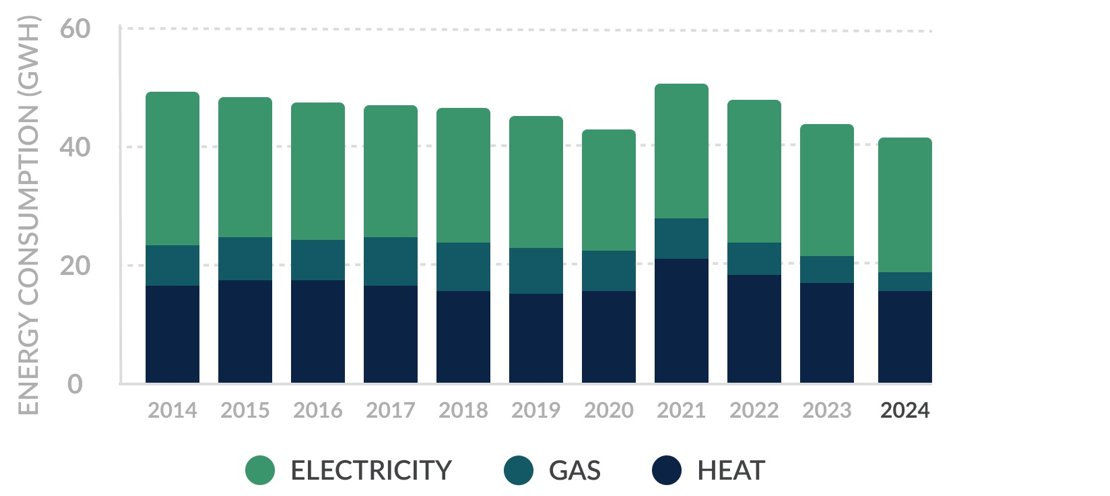
Energy use at UT 2014-2024
Solar panels
Currently, there are 2064 solar panels on campus. Their electricity production covers around 1.4% of UT’s annual electricity consumption. In 2025 the roof of Carré will be covered by 955 panels. More locations where panels can be placed in the future are being looked at.
Buildings
The decision was made in 2024 to focus on more efficient use of existing buildings rather than building new buildings. The update on the roadmap towards CO2 neutral real estate is expected in 2025.
Many measures from the roadmap have been implemented. An example is the optimisation of the buildings installations in Linde resulting in a 30% reduction in energy consumption. Boerderij Bosch and the adjacent building were sustainably renovated. The Cube, a new workshop building, was built including a green roof and 229 solar panels.
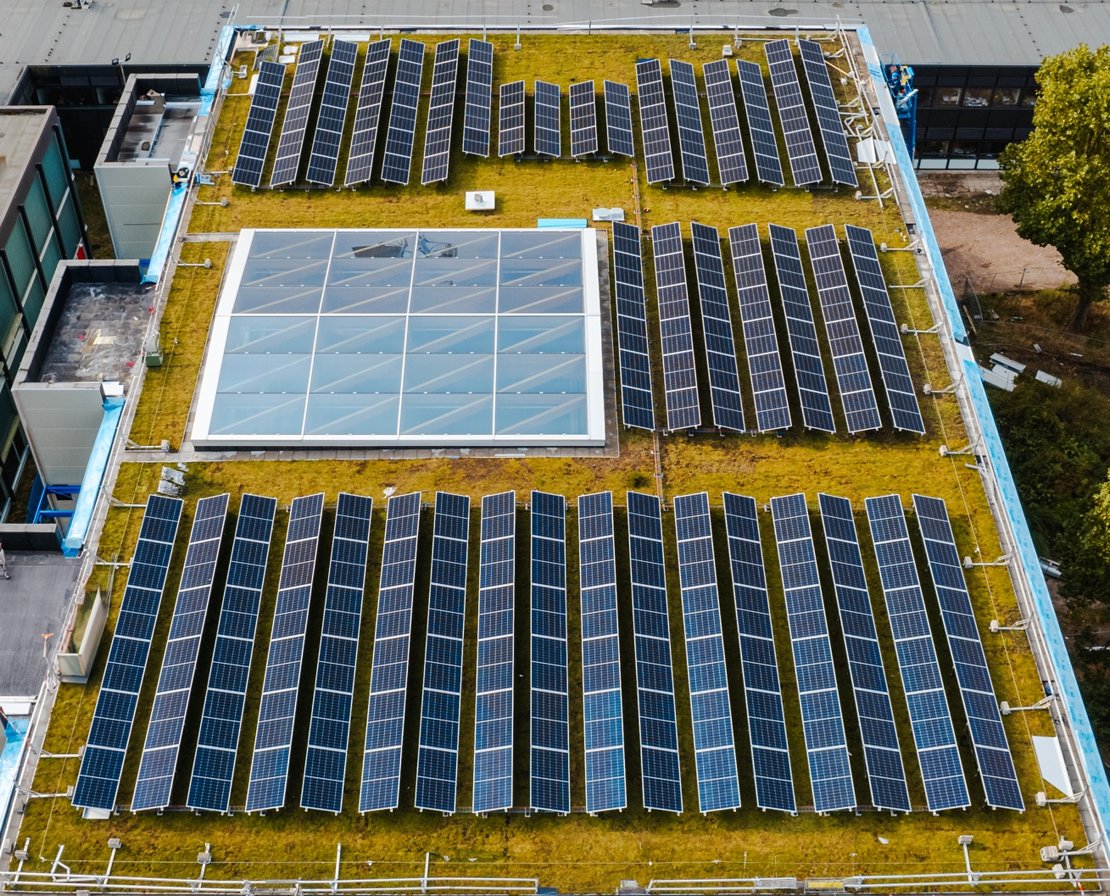
The green roof with solar panels of the new Cube building
Biodiversity
In 2024 a biodiversity council was established at UT. In this council, (scientific) staff members with biodiversity knowledge join the manager terrain and real estate and maintenance on discussing how biodiversity can be supported by specific measures or ways to conduct maintenance.
Another highlight is the BioBlitz that UT participated in in May and June. A total of 1023 species were observed on the UT campus in this period, increasing the knowledge about and visibility of biodiversity on our unique campus.
This was followed by a biodiversity series featuring articles on the nature observed on campus.
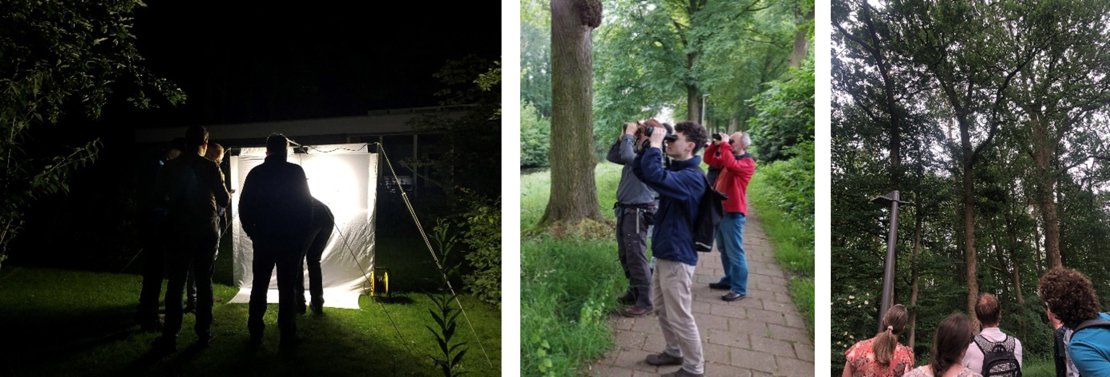
BioBlitz activities
Events
The SEE Programme, together with the Events office, wrote and published a Sustainable Events Plan (PDF). This document provides event organisors with all information about the sustainability goals for events on campus. In 2025 a Sustainable Events Guide (PDF) was published as a step-by-step guide for organizers to realize a sustainable event and implement all goals from the Sustainable Events Plan. Further, all large festivals on campus implemented a cup recycling system.
Four large events - Business Days Kick Off 2024, Business Days Career Fair, UIF event 2024, Week of Inspiration – applied for and received a Green Certificate from the Green Hub, that helps them to reduce their environmental footprint while still organizing a great event, for example by reducing the amount of waste, ensuring sustainable catering and minimizing energy use.
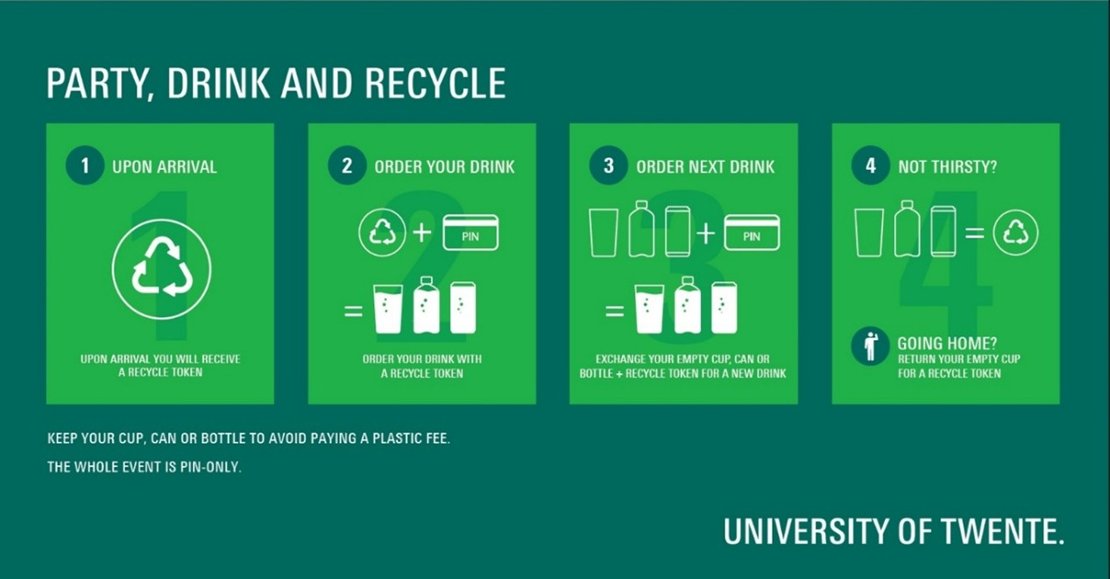
Banner about cup recycling made for the Kick-In 2024
Food & drinks
Together with UT-startup MiST Sustainable Solutions, a visualisation of the impact on land use, water consumption and CO2 emissions for five sandwiches was made for use in UT canteens. With this visualisation, customers are encouraged to consider the impact of a sandwich when choosing which one to buy. A survey was held among visitors of the canteen: one-third of the respondents said the visualization influenced their choice.
In 2025, the visualisations of food and drinks on offer will be expanded with a larger number of dishes and on more locations.
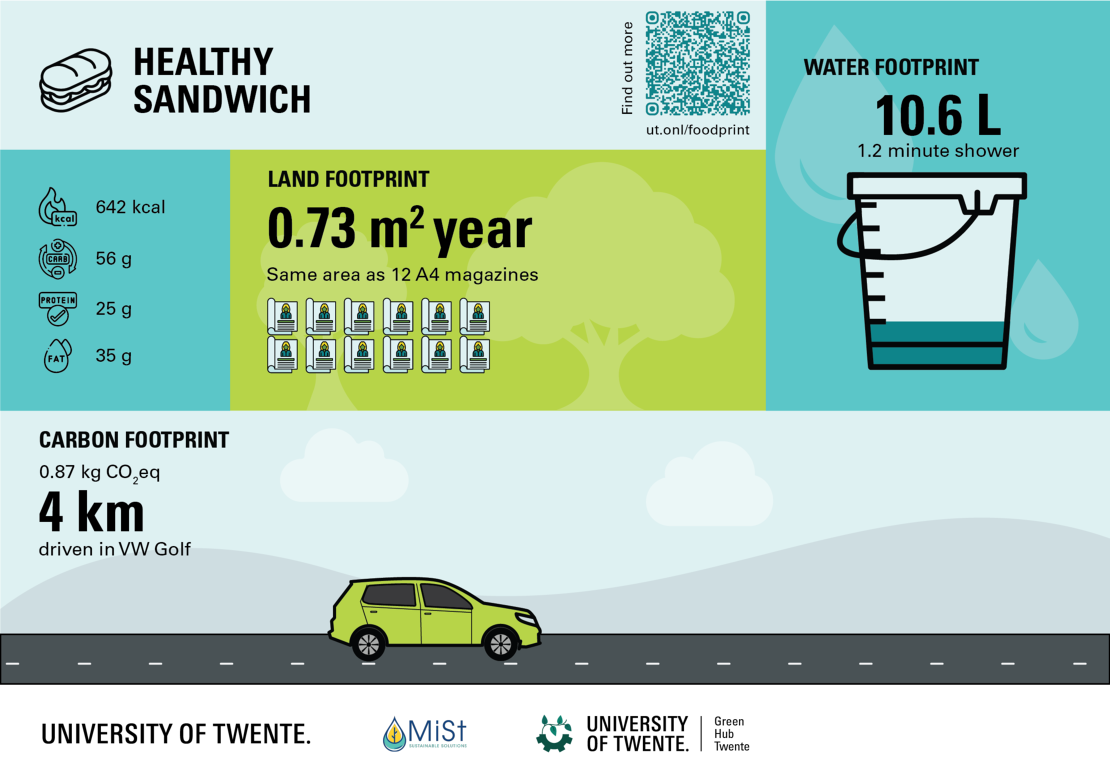
One of the impact visualizations from the pilo with MiSt
Procurement & purchasing
After taking many steps in 2023, the procurement and purchasing department continued its focus on sustainability in 2024. As such, sustainability criteria in tenders have been further strengthened. The European tender on chemicals included sustainability criteria, as well as the tender on flowers. Contract managers are putting sustainability high on the agenda during contract evaluation meetings, and suppliers are asked to provide sustainable alternatives whenever possible. At the direction of the Procurement & Purchasing department, more and more sustainable products are available in UT-related web shops.
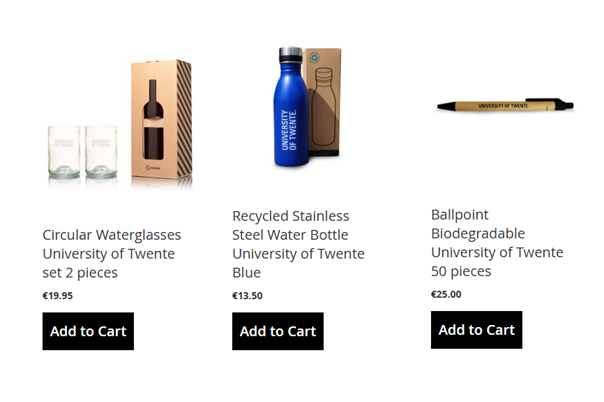
Examples of sustainable products from UT Gifts & Merchandise supplier Unigear
Procurement projects included adjusting the frequency of deliveries to UT and combining deliveries which reduce transport movements, the feasibility to stimulate orders to be delivered to UT in less or reusable packaging materials.
Travel & mobility
The CO2-emissions of flights by UT personnel is going down: in 2024, these emissions were 29% lower than in 2019. This is in line with the needed reductions to achieve the UT goal of adhering to the Paris Agreement, which calls for a 50% reduction in 2030.
In 2024 BI Studio of S&P built a PowerBI dashboard to enable more frequent reporting of flight data.
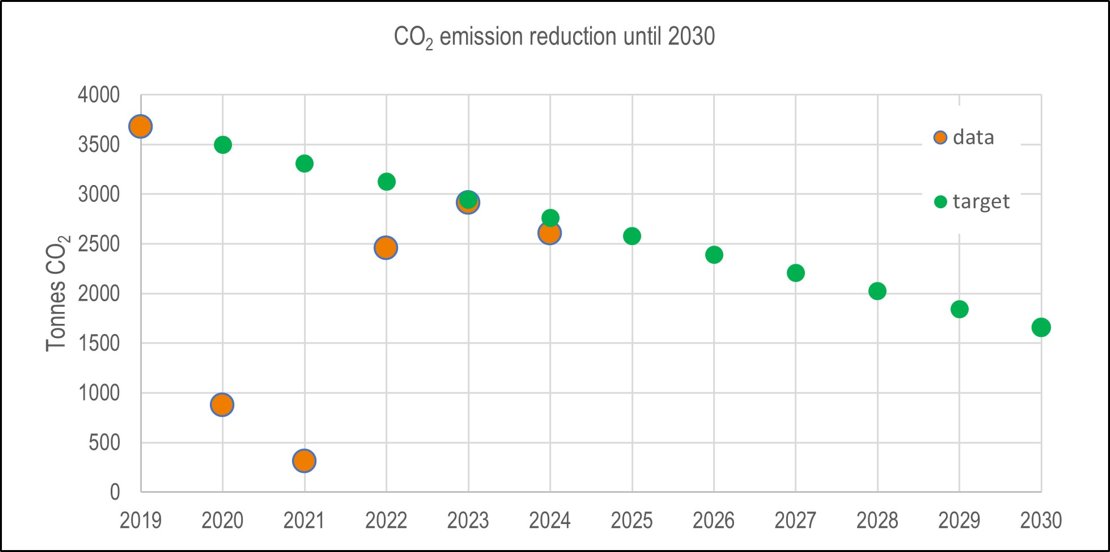
Graph comparing actual emissions from flights with the UT target. 2020 - 2022 were lower because of travel restrictions during the Covid pandemic.
The HR department sent out a survey to UT personnel about how we commute to campus. 57% of the kilometres travelled is done by a sustainable means of commuting: mostly public transport, followed by bicycles.
Water
Drinking water is a scarce resource, and will become more so in the future. For that reason, the government has asked large-scale consumers, such as UT, to reduce water consumption by 20% in 2035 compared to 2016-2019. In 2024, the consumption of drinking water at UT was reduced by 4% compared to 2019 and by 14% compared to 2023.
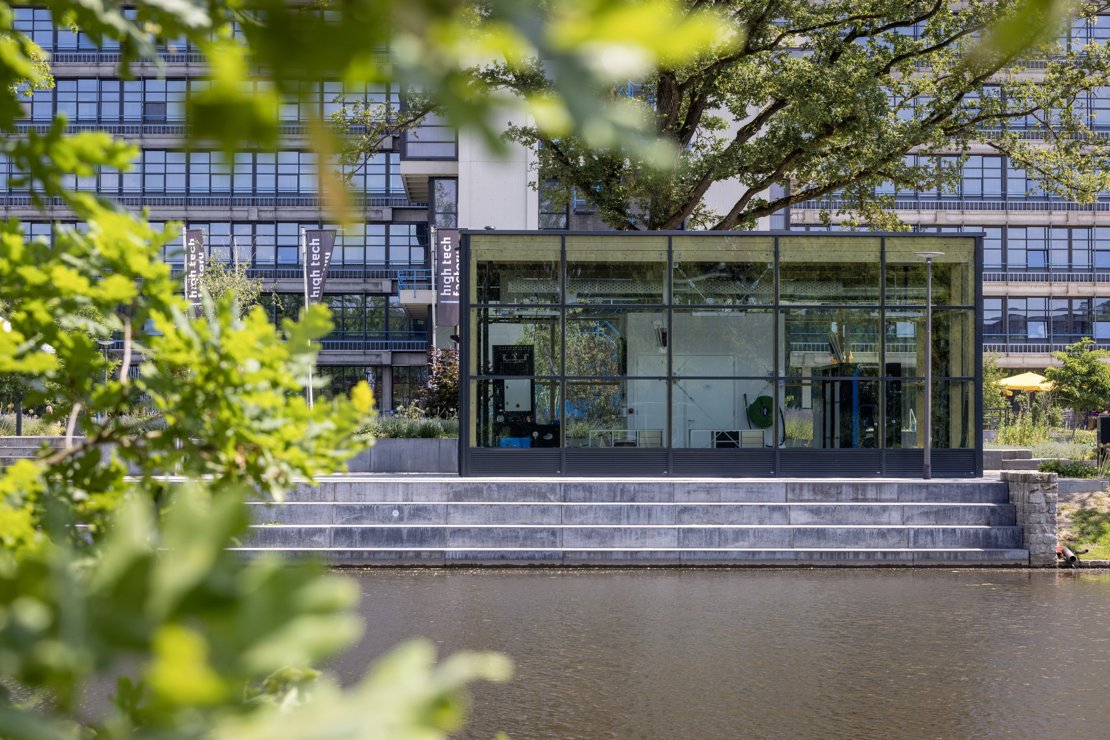
The Waterlab on the UT campus
Highlights of water reduction projects in 2024 include:
- Using the Waterlab’s WaterMiracle 4154 m3 of rainwater was filtered and used for irrigation instead of using drinking water (equals 4.2% of total water consumption).
- Road cleaning machines use filtered rainwater instead of drinking water (consumption 3-5m3/day).
- Weeds are removed using hot water. The water used for this is now also filtered rainwater.
- Water used to clean the boats at rowing association Euros is filtered canal water (filtered by a NX Filtration system).
A Saxion student Facility Management conducted her thesis on water saving within the SEE programme at UT. She researched how UT can save water in its buildings to contribute to the water reduction targets of -20% in 2035 as stated in the government letter. You can read more about what UT does to save water – and about what you can do – in this article.
Waste
In 2024, UT started working with a new waste processing company: Renewi. Not only do they process UT's waste, but they work with us and other stakeholders to reduce the amount of non-recyclable waste we produce. A major inventory took place in 2024 and various projects will be rolled out starting in 2025 to jointly increase waste separation rates and reduce the total amount of waste.

One successful project in 2024 was discontinuing the distribution of advertising print material on campus, reducing the amount of paper waste at UT with approximately 18,000kg per year – around 10% the total paper waste at UT.
Labs
Laboratories are of course essential facilities for our university. However, they have an exceptionally high impact on the environment due to their high energy demand and large amount of poorly recyclable, and potentially hazardous waste output. In order to make laboratories environmentally safe and sustainable, in 2024 the sustainable lab coordinator has been working to implement the Laboratory Efficiency Assessment Framework (LEAF) certification method in several labs.
Together with lab users and coordinators, many steps were taken to make UT labs more sustainable:
- Alarms on fume hoods: from April 2023 until May 2024, ~€23,000,- in energy was saved by installing alarms that warn lab users when fume hoods are left open.
- Freezer turned off: Thanks to a great collaboration between the S&T Faculty Green Hub, Green Hub Twente, the SEE-programme and the research groups Applied Stem Cell Technologies (AST), Developmental BioEngineering (DBE), and NanoBioPhysics, UT shut down a ultra-low temperature freezer saving 6000kWh/year (~2 x annual electricity consumption of a household). Read more in this article.
- Two laboratories achieved the bronze level LEAF certification. More labs will be requested to join this. Faculty Green Hub students that supported this process in 2024 played an essential role.

Unplugging an ultra-low temperature freezer
Would you like to know more about sustainability in UT labs? Watch this presentation by sustainable lab coordinator Rolf Slaats.
Contact
Do you have questions about sustainability at the University of Twente? Please contact us by sending an email to sustainability@utwente.nl.








